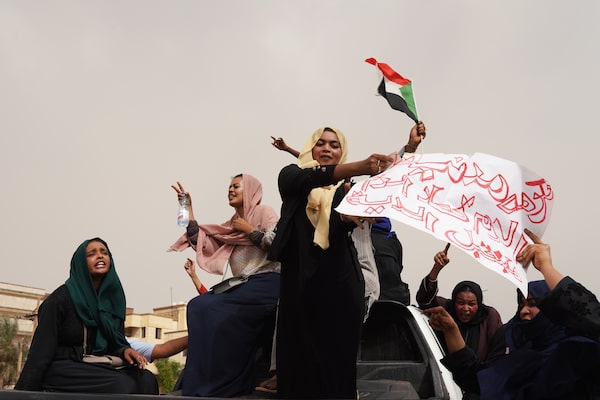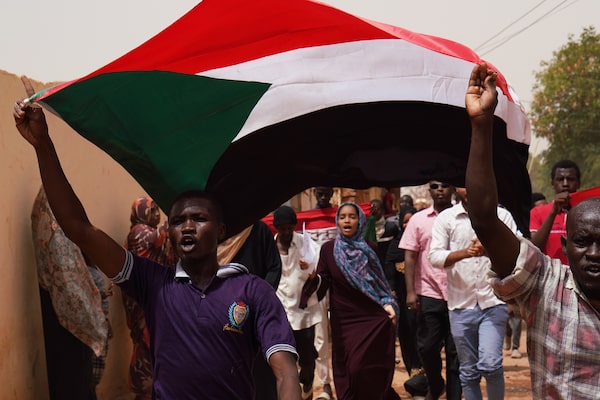
Protesters march against military rule in Khartoum, Sudan, on June 30.Andreea Campeanu/The Globe and Mail
Defying bullets and tear gas, hundreds of thousands of pro-democracy protesters marched across Sudan’s cities on Sunday, demanding a civilian government to replace the military regime that seized power in a coup.
The massive demonstrations filled the streets of Khartoum and many other cities, less than a month after a massacre by security forces that killed more than 100 protesters at their camp outside Sudan’s military headquarters.
In the biggest marches since the massacre, the protesters braved 40-degree heat, a prolonged state-ordered shutdown of the internet, a menacing police and military presence on the streets, and occasional volleys of tear gas and live ammunition.
The rallies on Sunday were an overwhelmingly peaceful show of strength by the protesters, who have been marching across Sudan since last December with scarcely a break. But at least five protesters were shot dead by security forces, according to a committee of doctors in the protest movement.

Protesters carry Sudan's flag in Omdurman on June 30.Andreea Campeanu/The Globe and Mail
Months of protests, originally sparked by an economic crisis, led to the toppling of long-ruling president Omar al-Bashir in April. He was replaced by a military council, in which power has increasingly been wielded by a paramilitary group called the Rapid Support Forces (RSF), formerly known as the Janjaweed, a notorious militia that committed atrocities against rebels and civilians in Darfur.
The RSF, which reportedly led the June 3 massacre of protesters in Khartoum, has dramatically expanded its presence in the capital in recent weeks. On Sunday it maintained a heavy presence across Khartoum, with hundreds of its vehicles moving in convoys or stationed on key roads and intersections.
Many of the pro-democracy demonstrators carried portraits of victims of the June 3 massacre. They vowed to continue their street action. “Even if they scare us and beat us and kill us, we don’t care,” said one of the protesters, 45-year-old businessman Diya Saleh.
“We’re not afraid,” he told The Globe and Mail. “We have thousands of years of history and civilization here, and we can’t accept anyone taking us backward. We have enough resources to be one of Africa’s richest countries, but there’s been mismanagement and corruption.”

Protests in Omdurman, Sudan, on June 30.Andreea Campeanu/The Globe and Mail
The protesters waved Sudanese flags and chanted “Civilian rule, civilian rule” as motorists honked their support. “The military council must fall,” they shouted.
Some protesters expressed outrage at a Canadian lobbying company, Dickens & Madson, which has signed a US$6-million contract to polish the image of Sudan’s military regime and to seek foreign support for it, including oil investment and weapon supplies for its security forces.
“It’s a crime against us,” said one of the protesters, Awad Ahmed, a 38-year-old labourer. “We are leading a revolution and this Canadian company is standing against us.”
The lobbying contract was signed by the RSF’s commander, General Mohamed Hamdan Dagalo, known as Hemedti, who is the deputy leader of the military council.
In a statement on the weekend, the New Democratic Party called for a federal investigation of The Globe’s reports that the Canadian lobbying firm may have violated United Nations sanctions and Canadian regulations, which prohibit most forms of weapons sales to the Sudan regime.
“These allegations are really serious and deeply concerning,” said NDP foreign affairs critic Guy Caron.
“It’s completely unacceptable that a Canadian company could be complicit in human rights violations and death,” he said in a statement.
The Montreal-based lobbying firm is headed by former Israeli intelligence officer Ari Ben-Menashe, who has previously lobbied on behalf of former Zimbabwean dictator Robert Mugabe and Libyan warlord Khalifa Haftar.
The lobbying firm has not responded to The Globe’s requests for comment. A person who answered its phone number said Mr. Ben-Menashe was travelling and unreachable.
In April, the pro-democracy movement established a round-the-clock camp at a site outside the military headquarters in Khartoum. But the camp was destroyed on June 3 in the armed attack led by RSF members. Since then, the protesters have mostly been confined to small neighbourhood marches, usually at night. With the internet shut down, it was the only way for them to send out their message to ordinary people.
In recent days, the protesters used their neighbourhood marches to summon people to Sunday’s mass demonstration. On Saturday night, they distributed surgical masks to help the protesters shield themselves from the anticipated tear gas.
One of the main opposition groups, the Sudanese Professionals Association, tried to hold a press conference on Saturday, but its offices were raided by security forces, preventing the event from being held.
During the marches on Sunday, the police and paramilitary forces used their vehicles to block any access to the site of the former protest camp, fearing that a new sit-in would begin.
General Dagalo, the RSF commander, said on Sunday that unidentified “snipers” had infiltrated the protests and killed several civilians and RSF members. But the protesters dismissed the claim, calling it an attempt to deflect blame from the RSF itself.
Mediators from the African Union and the Ethiopian government are trying to revive the collapsed negotiations between the protest movement and the military regime. The two sides have been unable to agree on the composition of an interim government, with the military insisting on retaining a majority of posts.
The RSF has won financial support from Saudi Arabia and the United Arab Emirates. It has supplied an estimated 15,000 troops to support the two countries in their military offensive in Yemen.
Our Morning Update and Evening Update newsletters are written by Globe editors, giving you a concise summary of the day’s most important headlines. Sign up today.
 Geoffrey York
Geoffrey York